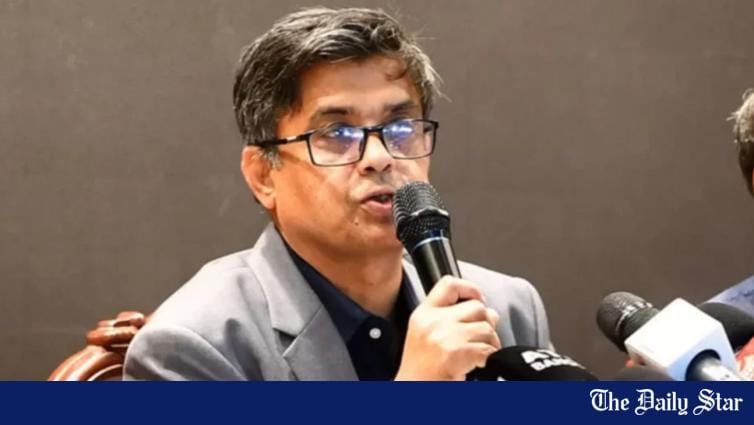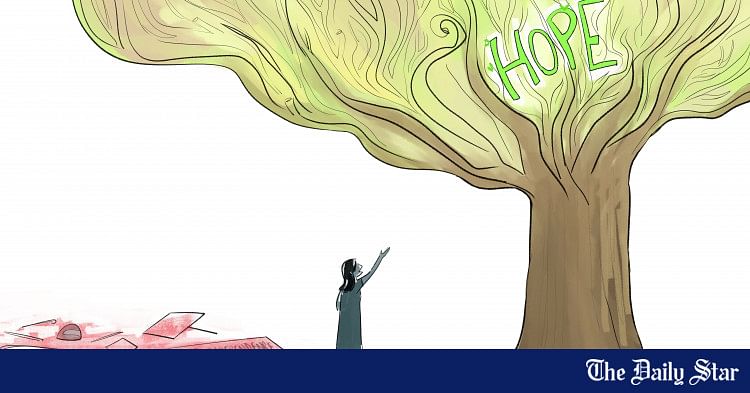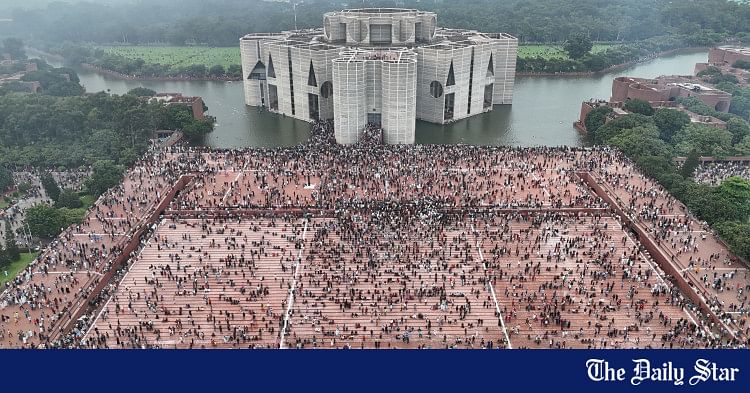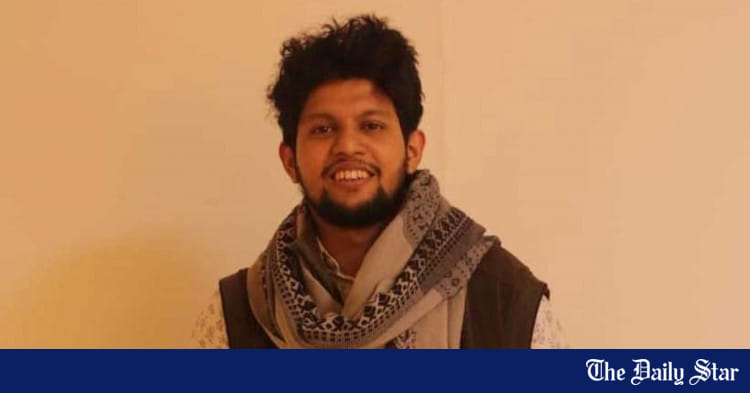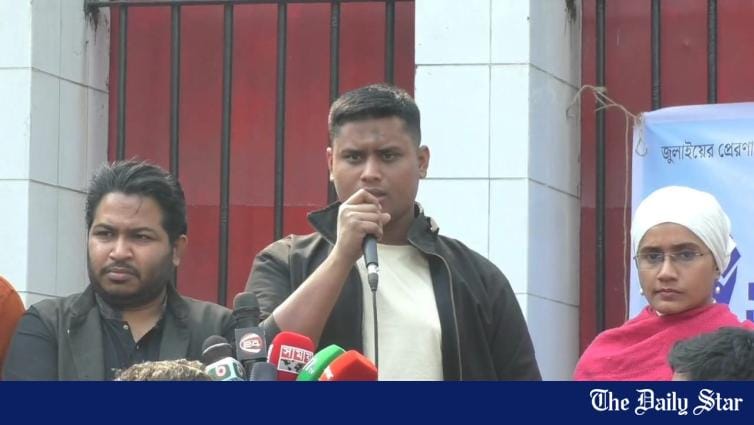Saif
Senior Member
- Messages
- 17,422
- Likes
- 8,377
- Nation

- Residence

- Axis Group


‘Proclamation Week’ announced in Jan 6–11
The Student Movement Against Discrimination and Jatiya Nagorik Committee on Saturday jointly announced ‘Proclamation Week’ from January 6 to 11, urging the interim government to formally...
 www.newagebd.net
www.newagebd.net
‘Proclamation Week’ announced in Jan 6–11
Staff Correspondent 05 January, 2025, 00:30

The Student Movement Against Discrimination and Jatiya Nagarik Committee jointly hold a press conference regarding the Proclamation Week from January 6 to 11 at the office of the Student Movement Against Discrimination in Dhaka on Saturday. | New Age photo
The Student Movement Against Discrimination and Jatiya Nagorik Committee on Saturday jointly announced ‘Proclamation Week’ from January 6 to 11, urging the interim government to formally proclaim the July Uprising by January 15 as per its commitment.
The leaders of the two organisations announced the programme at a press conference held at the office of the Student Movement Against Discrimination in the city.
They also warned of a tougher movement if the government failed to make any visible progress soon regarding the July uprising proclamation.
The weeklong nationwide campaign demanding the proclamation would feature leaflet distribution, rallies and public outreach activities.
Student Movement Against Discrimination convener Hasnat Abdullah said that they would engage with the public to ensure their aspirations are reflected in the proclamation.
Throughout the next week, programmes demanding the proclamation would be organised in every district, he said.
Hasnat said that the outreach efforts would also engage with all levels of society, including students, citizens, professionals, farmers, and workers across districts and upazilas.
‘During the “March for Unity” programme held at the Central Shaheed Minar on December 31, we demanded that the government announce the July Uprising proclamation by January 15, but unfortunately no visible initiatives have been taken in this regard so far,’ he said.
If the government takes effective initiatives regarding the declaration, the Anti-Discrimination Student Movement and the National Citizens Committee are ready to express their opinions on the matter.
Jatiya Nagorik Committee convener Nasiruddin Patwary said that if no visible and effective initiatives were taken in the following days for the proclamation, they would move towards stricter measures.
‘We were ready to proclaim the July uprising on December 31 at the Central Shaheed Minar, but we did not as the interim government promised to prepare a proclamation of the July mass uprising based on national consensus,’ he said.
Nasiruddin said that the announcement of the proclamation was important and it must honour the aspirations of people, who from all walks of life participated in the uprising.
He also said that there was no disagreement between political parties on the July Proclamation but there were some differences in viewpoint, and the Student Movement Against Discrimination was able to resolve those differences.
At the press conference, the two platforms presented a set of demands, stressing the importance of official recognition of the uprising martyrs and state-provided medical treatment for those injured during that time.
They also demanded a clear commitment from the government to hold the trial of those responsible for the killings.
Having called for the abolition of the existing constitution and creation of a new, the student leaders demanded a democratic constitution through an elected constituent assembly.
The organisations also demanded that the leadership of the Student Movement Against Discrimination must be clearly recognised in the proclamation of the uprising.
They also demanded that the proclamation should establish a clear connection between the July 2024 uprising, the 1947 partition, and the 1971 War of Independence, ensuring continuity in the struggle for justice.
The Student Movement Against Discrimination and the Jatiya Nagorik Committee also called for a new political settlement prioritising a state structure with civic identity at its core, aimed at eliminating all forms of discrimination.
Staff Correspondent 05 January, 2025, 00:30
The Student Movement Against Discrimination and Jatiya Nagarik Committee jointly hold a press conference regarding the Proclamation Week from January 6 to 11 at the office of the Student Movement Against Discrimination in Dhaka on Saturday. | New Age photo
The Student Movement Against Discrimination and Jatiya Nagorik Committee on Saturday jointly announced ‘Proclamation Week’ from January 6 to 11, urging the interim government to formally proclaim the July Uprising by January 15 as per its commitment.
The leaders of the two organisations announced the programme at a press conference held at the office of the Student Movement Against Discrimination in the city.
They also warned of a tougher movement if the government failed to make any visible progress soon regarding the July uprising proclamation.
The weeklong nationwide campaign demanding the proclamation would feature leaflet distribution, rallies and public outreach activities.
Student Movement Against Discrimination convener Hasnat Abdullah said that they would engage with the public to ensure their aspirations are reflected in the proclamation.
Throughout the next week, programmes demanding the proclamation would be organised in every district, he said.
Hasnat said that the outreach efforts would also engage with all levels of society, including students, citizens, professionals, farmers, and workers across districts and upazilas.
‘During the “March for Unity” programme held at the Central Shaheed Minar on December 31, we demanded that the government announce the July Uprising proclamation by January 15, but unfortunately no visible initiatives have been taken in this regard so far,’ he said.
If the government takes effective initiatives regarding the declaration, the Anti-Discrimination Student Movement and the National Citizens Committee are ready to express their opinions on the matter.
Jatiya Nagorik Committee convener Nasiruddin Patwary said that if no visible and effective initiatives were taken in the following days for the proclamation, they would move towards stricter measures.
‘We were ready to proclaim the July uprising on December 31 at the Central Shaheed Minar, but we did not as the interim government promised to prepare a proclamation of the July mass uprising based on national consensus,’ he said.
Nasiruddin said that the announcement of the proclamation was important and it must honour the aspirations of people, who from all walks of life participated in the uprising.
He also said that there was no disagreement between political parties on the July Proclamation but there were some differences in viewpoint, and the Student Movement Against Discrimination was able to resolve those differences.
At the press conference, the two platforms presented a set of demands, stressing the importance of official recognition of the uprising martyrs and state-provided medical treatment for those injured during that time.
They also demanded a clear commitment from the government to hold the trial of those responsible for the killings.
Having called for the abolition of the existing constitution and creation of a new, the student leaders demanded a democratic constitution through an elected constituent assembly.
The organisations also demanded that the leadership of the Student Movement Against Discrimination must be clearly recognised in the proclamation of the uprising.
They also demanded that the proclamation should establish a clear connection between the July 2024 uprising, the 1947 partition, and the 1971 War of Independence, ensuring continuity in the struggle for justice.
The Student Movement Against Discrimination and the Jatiya Nagorik Committee also called for a new political settlement prioritising a state structure with civic identity at its core, aimed at eliminating all forms of discrimination.

